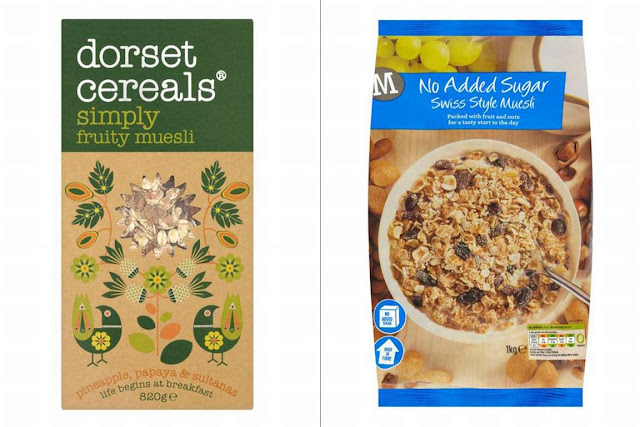Too much Sugar is bad for us and we all know this, yet majority of us still eat it- sometimes in large amounts - on a daily basis or even more than once a day.
However if you knew exactly what areas of the body sugar affects and which organs it harms, would it change your unhealthy ways?
Sugar can have a myriad of effects on the brain. According to researchers, excessive sugar consumption can exacerbate depression and anxiety by causing energy spikes followed by crashes.
It also messes with the neurotransmitters that help regulate our mood and could contribute towards dementia in later life.
The online tool for Benenden reveals what else happens to the body when you overindulge on sugary snacks and drinks. And to be honest I am a culprit when it comes to craving sugary drinks :-(
According to researchers, the sweet substance can also play havoc with vital organs in our bodies such as the kidneys, digestive system and genitals.
In women, high blood sugar levels have been thought to contribute to recurring bouts of yeast infections such as thrush.
In men, it can be responsible for erectile dysfunction and lack of sex drive. So it is very important for both men & women to watch the amount of sugar intake we consume.
Meanwhile in children, sugar can affect the heart, bones and immune system. And, of course, it contributes to obesity.
Currently, the recommended daily sugar intake for adults is 30 grams per day, however many people are consuming almost double this amount - the current average daily intake is 58.8 grams.
(source-msn.com/en-gb/health/nutrition)
The below food swaps can cut your sugar intake if you consume them:-
I found this online and thought to share with you..
Low sugar market alternatives- Are you keen to slash your consumption of the white stuff? You'd be making a wise move. Study after study has linked high-sugar diets with obesity, heart disease, type 2 diabetes and bowel cancers, and we all know what those tiny sweet crystals do to our teeth.
In fact, earlier this year a committee of influential scientists advised the government to halve the recommended daily intake of sugar to no more than 5% of total calories consumed – about seven teaspoons – and experts from the World Health Organization (WHO) have also urged us to dump the lumps and limit daily sugar intake to less than 10% of total calories consumed, ideally 5% or less for “additional health benefits”.
If only it were that easy. From ready meals to snacks, high levels of sugar lurk in all sorts of supermarket food and drink, Check out some of the below for savvy swaps.
Swap Haagen Dazs Chocolate Salted Caramel Ice Cream for Oppo Salted Caramel Lucuma Ice Cream
Salted caramel ice cream is of course best-avoided if you're cutting down on sugar, but if you really can't resist, it's worth noting that Oppo's version has just 6.7g of sugars per 100g, whereas Haagen-Daz's take on the flavour rocks 22.5g per 100g.
Swap Kettle Chips Sweet Chilli & Sour Cream Crisps for Walkers Sensations Thai Sweet Chilli
Enjoy munching on sweet chilli flavour crisps? The fancy Kettle Chips version packs 4.3g of sugars per 100g, while the Walkers Sensations favourite contains only 1.1g of sugars per 100g.
Swap Weight Watchers Carrot Cake Slices for Sainsbury's Taste the Difference Carrot Cake
Tut, tut Weight Watchers for packing a whopping 43.3g of sugars per 100g in these carrot cake slices – unsurprisingly, sugar is the main ingredient. Sainsbury's Taste the Difference version however contains just 29.1g of sugars per 100g.
Swap Sainsbury's Chicken Tikka Masala with Rice for Weight Watchers Chicken Tikka with Basmati Rice
If you're a fan of ready meal chicken tikka and want to cut down on sugar, opt for Weight Watchers' version over Sainsbury's own-brand – it contains almost five times less sugar than the Sainsbury's curry.
Swap Cadbury Dairy Milk for Hotel Chocolat Supermilk
Yes, it's more expensive, but Hotel Chocolat's Supermilk is much lower in sugar than the Cadbury classic with just 20g of sugars per 100g against Cadbury's 56g of sugars per 100g.
Swap Belazu Aged Balsamic Vinegar for Aspall Organic Balsamic Vinegar
No wonder Belazu's balasmic vinegar is a taste sensation – it contains an eye-watering 82.g of sugars per 100ml. Aspall's organic alternative on the other hand has only 17.5g of sugars per 100ml.
Swap Vita Coco Natural Coconut Water for Naked Coconut Water
Vita Coco's cult coconut water isn't 100% free from the white stuff. It contains added fruit sugar, upping its total sugar content to 5g per 100ml. Naked Coconut water is just that – with nothing at all added, it has only 2.5g of sugars per 100ml.
Swap Heinz Organic Tomato Ketchup for Heinz 50% Less Sugars & 25% Less Salt Tomato Ketchup
Heinz organic ketchup is its sweetest, even more so than the regular version, with 24.8g of sugars per 100g. If you can't face defecting to another brand, snap up the low-sugar alternative – it contains just 11.4g of sugars per 100g.
Swap Dorset Cereals Simply Fruit Muesli for Morrisons No Added Sugar Swiss Style Muesli
Although it seems like an ultra-healthy breakfast option, muesli tends to be laden with the white stuff - Dorset Cereal's delicious fruity cereal has 28g of sugars per 100g for instance. Look for a no added sugar muesli if you can, like this Morrisons Swiss-style alternative - it contains just 14.5g of sugars per 100g.
Swap Tesco Finest Lasagne Al Forno for Tesco Finest Traditional Lasagne
Bizarrely, Tesco Finest Lasgane Al Forno packs 4g of sugars per 100g, around four teaspoons of the white stuff per ready meal, but the similar Traditional Lasagne – also Tesco Finest – contains only 1.6g of sugars per 100g.
(source-msn.com/en-gb/health/nutrition)















































